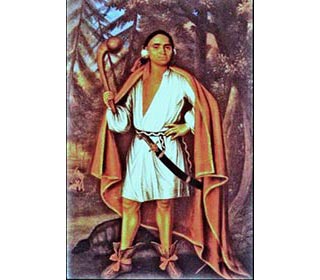History of Massachusetts Indians - The French Indian Wars
The French and Indian Wars (1688 - 1763) was a generic names for a series of wars, battles and conflicts involving the French colonies in Canada and Louisiana and the 13 British colonies, which included Massachusetts, consisting of King William's War (1688-1699), Queen Anne's War (1702-1713), King George's War (1744 - 1748) and the French and Indian War aka the Seven Years War (1754-1763). Various Massachusetts Indian tribes were allied to the French and British colonies during the French Indian Wars which raged for nearly 75 years. Fast Facts about the History of Massachusetts Indians
The climate, land, history, environment and natural resources that were available to the indigenous Indian tribes in Massachusetts resulted in the adoption of the Northeast Woodlands culture. - Name of State: Massachusetts
- Meaning of State name: Name of an Algonquian tribe meaning At the Great Hill.
- Geography, Environment and Characteristics of the State of Massachusetts: Jagged coast and gentle hills
- Culture adopted by Massachusetts Indians: Northeast Woodlands Cultural Group
- Languages: Iroquoian and Algonquian
- Way of Life (Lifestyle): Hunter-gatherers, farmers, fishers, trappers
- Types of housing, homes or shelters: Chickees, Wigwams (aka Birchbark houses) and Longhouses
History Timeline of the Massachusetts Indians - 10,000 B.C. : Paleo-Indian Era (Stone Age culture) the earliest human inhabitants of America who lived in caves and were Nomadic hunters of large game including the Great Mammoth and giant bison
- 7500 BC: Eastern Woodland Culture of Fisher Hunters begins. Permanent houses and farming
- 7000 BC: Archaic Period in which people built basic shelters and made stone weapons and stone tools
- 2500 BC: Gulf Formational Period with development of ceramics and pottery
- 1675: 1675 - 1677: King Philip's War so named after Metacom (King Philip) of the Wampanoag tribe, who was called Philip by the English. The war was bloody and bitterly fought by the colonists against the Native Indians. During King Philip's War, up to one third of America's white population was wiped out. This war proved to be the final struggle by the Native Americans of Massachusetts
- 1688: 1688 - 1763 The French and Indian Wars between France and Great Britain for lands in North America consisting of King William's War (1688-1699), Queen Anne's War (1702-1713), King George's War (1744 - 1748) and the French and Indian War aka the Seven Years War (1754-1763)
- 1688: (1688-1699) King William's War (part of the French and Indian Wars) between France and the Wabanaki Confederacy and England and the Iroquois Confederacy. Peace Treaty made at Pemaquid. August 11,1693. and was ratified on Jan. 7. 1699
- 1702: (1702-1713) Queen Anne's War (part of the French and Indian Wars) between the French and Spanish colonies allied with the Wabanaki Confederacy, Mohawk, Choctaw, Timucua, Apalachee and Natchez tribes against the British colonies allied with the Muscogee (Creek), Chickasaw and Yamasee tribes
- 1744: (17441748) King George's War (part of the French and Indian Wars) between the French colonies allied with the Wabanaki Confederacy and the British colonies allied with Iroquois Confederacy
- 1774: December 16: The Boston Tea Party - Massachusetts patriots dressed as Mohawk Indians protested against the British Tea Act
- 1754: 1754 - 1763: The French Indian War is won by Great Britain against the French so ending the series of conflicts known as the French and Indian Wars
- 1763: Treaty of Paris
- 1775: 1775 - 1783 - The American Revolution.
- 1776: July 4, 1776 - United States Declaration of Independence
- 1803: The United States bought the Louisiana Territory from France for 15 million dollars for the land
- 1812: 1812 - 1815: The War of 1812 between U.S. and Great Britain, ended in a stalemate but confirmed America's Independence
- 1830: Indian Removal Act
- 1832: Department of Indian Affairs established
- 1861: 1861 - 1865: The American Civil War.
- 1862: U.S. Congress passes Homestead Act opening the Great Plains to settlers
- 1865: The surrender of Robert E. Lee on April 9 1865 signalled the end of the Confederacy
- 1887: Dawes General Allotment Act passed by Congress leads to the break up of the large Indian Reservations and the sale of Indian lands to white settlers
- 1969: All Indians declared citizens of U.S.
- 1979: American Indian Religious Freedom Act was passed
|
